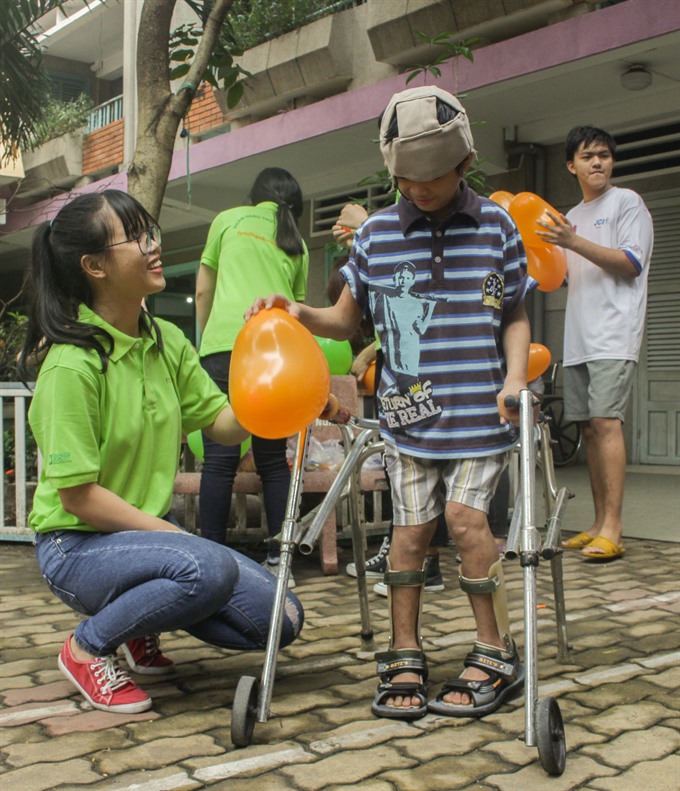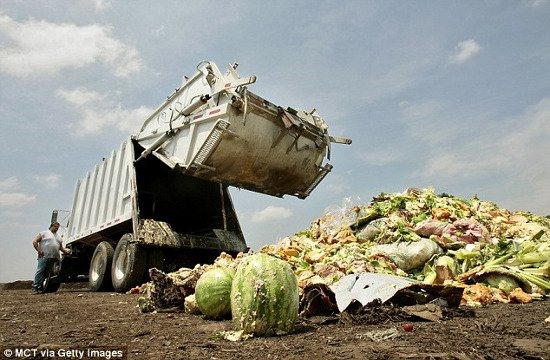 |
| Warm meal: Foodbank Vietnam helps distribute food to those in need. |
Viet Nam News
Mai Phuong
HA NOI — With more than 15 years volunteering for charity projects, Nguyen Tuan Khoi, 34, from HCM City, said he has witnessed hunger first-hand.
However, during many trips across Viet Nam, he also found so much food being wasted every day in the country.
“The idea providing food, which might otherwise be wasted, to those who really need it, inspired me to set up a project helping improve the living conditions of many hungry people,” said Khoi.
From this desire, the non-profit Foodbank Vietnam was born.
With the support of the government-sponsored Vietnam Red Cross (VCRC), Foodbank Vietnam debuted earlier this year with a pledge to reduce poverty; raise social awareness about saving food; as well as boost connections and coordination between food suppliers and resource centres with charity shelters and organisations for poor and disadvantaged people, project founder Khoi explained to Viet Nam News.
After just seven months, the project based on No Trang Long Street, in HCM City’s Binh Thanh District, has donated food to 10 charity shelters in the city.
“More than 5,000 meals are provided each month to 10 places sheltering the homeless, many of them children. We have gradually collected the food from five suppliers in HCM City,” according to Khoi.
The project’s slogan is “For a sharing Viet Nam”, and it leans on the support of more than 100 volunteers. The aim is not just to distribute food for the poor in the city, but also to those who face difficulty circumstances in the region, particularly those in mountainous and remote areas.
“Our aim is to do something to eradicate hunger in the country and to establish a large food bank in Viet Nam to provide long-term sustenance for those in need, contributing to social security,” Khoi said.
From August this year, Foodbank will start to contact at least 100 food stores and a wholesale market in order to receive expired food that is unable to be sold.
Any sellers or stores can visit the project’s website at Foodbankvietnam.com, to find out more information and sign up to donate produce.
 |
| Important work: Disabled children are among the beneficiaries of Foodbank Vietnam. |
 |
| Unsustainable: A survey by Electrolux on 4,000 households spread across 8 countries in Asia – Pacific said that Viet Nam ranks second for food waste in the region, following China. Photo khoahoc.tv |
Food waste in Viet Nam
Statistics from the Viet Nam Motherland Front show that in the first half of 2017, there were 574,000 people suffering from hunger in the country.
Meanwhile, a recent survey by Electrolux on 4,000 households spread across 8 countries in Asia and the Pacific said Viet Nam ranked second for food waste in the region, following China.
About 87 per cent of households in the survey admitted that they waste two plates of food per week on average.
A report presented at the World Cold Chain Summit in HCM City held earlier this year revealed Viet Nam annually loses an estimated 694,000 tonnes of meat, 7 million tonnes of vegetables and fruits, and 805,000 tonnes of seafood during the preservation and transport processes.
Additionally, 168 million bananas, 11,000 pigs and 139,000 chickens cannot reach consumers each year, the report said.
Vegetables and fruits account for the largest proportion of wasted food products at 31 per cent, including 26 per cent being damaged in post-harvest, much higher than Southeast Asia’s average of 15 per cent. Meanwhile, the rates for wasted meat and seafood are 14 per cent and 12 per cent, respectively.
At the summit, CEL Consulting general director Julien Brun said the waste of food in Viet Nam was mentioned years ago but this was the first time quantitative figures had been established.
There are many reasons why Vietnamese people waste so much food.
Luong Quang Thi, founder and CEO of ABA Company specialising in cold preservation and transport, said on the sidelines of the summit that incorrectly storing and transporting food will not only increase waste but also reduce quality, affecting consumers’ health.
In Viet Nam, both consumers and food producers are not aware of the importance of cold supply chains, a solution to reduce food waste. In reality, some food processors have cut steps in the cold chains to reduce costs while transport costs are high, Thi said on aba.com.vn.
Culturally, cooking more food than necessary is considered a gesture of hospitality and generosity.
“This has become a custom not only in families but also in restaurants and ceremonies. While Vietnamese people have a habit of saving leftovers for future meals,” said Dang Huong Lan, a consumer and consulting expert on the environment from Ha Noi.
Lan said many people often forgot about excess food or fresh ingredients left in the fridge.
A considerable amount of food was also lost or damaged during production, storage, transportation and distribution, due to the lack of investment in technology and infrastructure, she added.
The preference for fresh food also means that items more than a day old, though still safe to eat, are too easily considered garbage and thrown away because no one is buying them.
The idea of setting up Foodbank Vietnam is important, since Viet Nam faces an urgent food waste crisis.
Besides the environmental benefits, the idea will also help promote social humanitarian activities in the country.
In April, Foodbank Vietnam organised a seminar titled "Fighting Food Waste" for representatives from the food and beverage industry to raise awareness about reducing food waste and requesting that they redirect their excess food to the programme.
In the long term, there are plans to develop a system of ‘Mobile Food Banks’, or stations to receive and give out free food, as well as ‘Food Bank Eateries’, selling low-priced meals for disadvantaged people throughout the country.
Another important part of the project is to build an emergency food bank to provide food during natural disasters, which happen every year in the country. — VNS
OVietnam